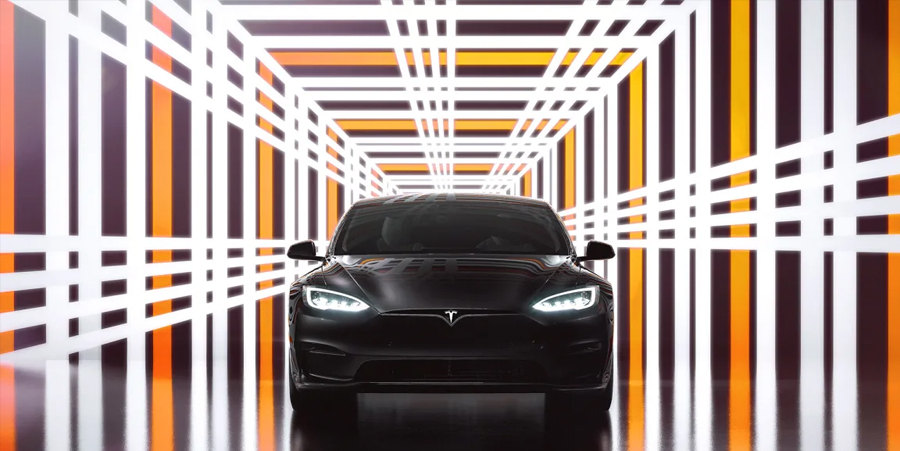Tesla and Elon Musk have become so iconic, they can withstand Hertz buying 100,000 Teslas for its fleet.
On Monday, rental car company Hertz announced it had placed an order for 100,000 Tesla vehicles, which would boost electric vehicles to about 20% of its global rental fleet. For Tesla, the deal represents about $4.2 billion in revenue, and the news sent its stock up by almost 13%. It also boosted the electric vehicle company’s market cap across the $1 trillion mark for the first time.
The finances of the deal excited investors and Tesla fans alike, but there was one thing missing amid all the jokes and public celebrations: What are the brand implications for Tesla—the coolest, most popular, cult car brand of the 21st century—being tied so publicly to an old-school, car rental brand that hasn’t had a cultural moment since O.J. Simpson was running through airports? The same Hertz that declared bankruptcy in May?
Tesla is a brand that has defied all convention and become one of the most iconic (and polarizing) in popular culture by pushing boundaries—in automotive tech, in how cars are sold and serviced, and in how its CEO interacts with the public. A tweet from Elon Musk has become as impactful as the best Super Bowl
Rental car fleets, on the other hand, are often the least sexy, least exciting car models. No one’s jumping up and down to climb into that Chevrolet Impala, but it’s reliable and will get you to your hotel from the airport without any hassles. If most rental models are the khaki pants of cars, Tesla is either adding its Supreme cachet to the mix, or diluting its hard-earned cool on the way to becoming Von Dutch.
There were not a lot of doubters amid Tesla’s record day. “Hertz isn’t going to bring Tesla down, because the Tesla brand is too strong for that,” says Vann Graves, executive director of VCU Brandcenter. “And because Tesla focuses on future-forward thinking, it leads consumers to think they’re going to bring some of that innovation to the rental market. They may not, but it injects new energy into an old model and industry. Any kind of move like this, people are going to watch.”
In fact, Tesla’s getting a completely new kind of marketing and experience partner. Hertz launched new ads starring Tom Brady and Tesla on the same day that the car deal was announced, and said it will be installing thousands of EV chargers across its network. For anyone who has complained that Tesla didn’t engage in its own marketing (like, um, me), now Tesla gets the benefit of a large brand marketer without having to become one itself. For fans of Tesla, spreading the word, getting bigger and more popular is a very good thing, a confirmation of their own good taste, of their prescient bet on the future.
“You’re really putting a Tesla in more people’s hands, and giving them a chance to get used to a level of technology and comfort maybe they’re not used to having,” says Graves. “You’ve just opened the door and made every Hertz a Tesla showroom.” As well as potentially a source of recurring revenue beyond refreshing its fleet. The host of the popular Tesla Daily podcast was already speculating on the possibility of Hertz marketing an upsell to Tesla’s Full Self-Driving mode, with the two companies splitting the revenue.
Maybe this is the streetwear strategy further moving into the automotive market. But instead of a limited-edition Adidas VW or Paul Smith Land Rover, this is two related brands giving each other a boost in different ways. An automotive version of Supreme x Champion, perhaps, which starting back in 2010 completely reinvigorated the latter apparel maker.
Brands of all stripes, beyond just fashion, are using each other to tap into new audiences. Witness the Trolli Xbox or Cheetos Flamin’ Hot Mountain Dew. Though the balance of cool here is far from equal, Hertz has scale and the ability to spread the Gospel of Elon.
“Tesla is a brand and Elon Musk is a brand, there’s a buzz that comes with that,” says Graves. “If this was about just another automotive company, no one would really care. It wouldn’t be on the news, and we wouldn’t be talking. But because this is a brand that takes risks, and is willing to take risks, and has the swagger to do it, it’s a win–win for both companies.”
…
This article first appeared in www.fastcompany.com
Seeking to build and grow your brand using the force of consumer insight, strategic foresight, creative disruption and technology prowess? Talk to us at +971 50 6254340 or mail: engage@groupisd.com or visit www.groupisd.com/story




